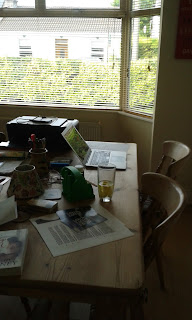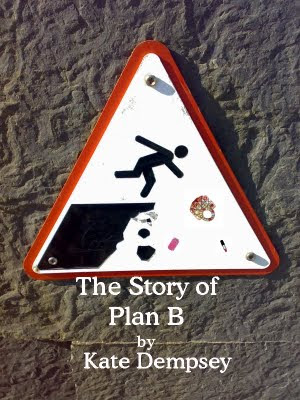Hi Roisin and welcome to writing.ie. How did you first get into writing?
Short answer: I entered a competition when I was 18. Part of the entry involved finishing a sentence in 10 words or less. The first part of the sentence was "I would like to win a Ford Fiesta because.....' I ended it with '....my father won't let me drive his.' I won a Ford Fiesta.
Long answer: When I left school I went to Training College (just after winning the car) and in due course I qualified as a primary teacher. After 9 years of teaching I felt like taking a break but didn't know what to do. A cousin suggested I try to get a job in advertising 'because you're good with words.' He was referring to all the other sentences I'd finished after winning the Ford Fiesta, which had resulted in my winning a lot more: two holidays, a hotel break, a bicycle, a watch, a sweater, a dairy foods hamper, a set of crockery and enough air miles to fly to San Francisco and back. I took my cousin's advice and wangled a job as advertising copywriter in an agency in London. I worked there happily for three years and then returned to the classroom. While I was in London I began to think about writing a book, but it was to be another decade before I took another career break and flew - yes, to San Francisco (remember the air miles?) where a brother of mine lived. There I wrote my first book, not having much of a clue about what I was doing, just telling a story and hoping for the best. It ended up winning a 'Write a Bestseller' competition and was published by Tivoli Books in 2004 as
The Daisy Picker.
What a great story in itself! How does writing full time compare to teaching?
Impossible to compare, although I did love teaching, almost as much as I love writing. But being a full time writer brings so much flexibility that teaching couldn't offer, like being able to work in my pjs - even to bring the laptop to bed for the day if I feel like it, or relocating to wherever I want to write - anywhere the sun is shining, or setting my own working hours - my insomniac tendencies often have me awake before 5.00am, so my working day could start then and finish by lunchtime.
One thing full time writing doesn't deliver is the company of children, which of course I had in spades during my teaching days, so to compensate I tell stories once a month to 'smallies' in my local library, and I also visit schools and libraries and chat to kiddies about life as a writer. Teaching had a lot to recommend it; every day I experienced the joy of having a gang of little ones to nurture and look after, but on balance, I'm happier as a writer, and feel very blessed to be making my living doing what I love most.
Where do you do your writing?
Here's where I write: the kitchen table, in all its higgledy-piggledy glory.
(The book on the table was pure chance - I'm sending it off to someone today.)
I know you sometimes head off with your laptop. Does that help your writing, do you think? Or just your headspace?
I think it helps with both, Kate. It’s good to be away from distractions of family and friends - and a bonus if wherever I'm heading doesn't have wi-fi! - and I always feel the writing is turned up a notch when the surroundings are unfamiliar, and my routine as a result somewhat changed. I love going somewhere sunny, not because I'll be lying out in it, but even looking out at a blue sky does me good, and I feel perks up the writing too.
Do you have a writing group or a reader?
No writing group, no reader. I'm a bit precious in that respect, hate showing it to anyone until I surrender the completed first draft to my editor and agent simultaneously. I'd be iffy about letting a group read it, in case they all came back with different verdicts - and I'm not sure that I'd trust the judgement of a single reader either.... As it is, my editor and agent each give me feedback, so I have two sets of notes to work on for draft two, which I feel is plenty.
I guess your editor and your agent are your readers then! How did you get this agent?
My agent,
Sallyanne Sweeney of
Mulcahy Associates in London, was recommended to me by
Vanessa McLoughlin, the brains behind
www.writing.ie which is a wonderful go-to for all things writerly.
Didn’t you have an agent before her? I'm interested in how you got your first agent.
My first agent came on board after I got the publication deal, so I'm not sure that'll be of any use to any writers out there! I won the two-book deal and then I thought 'I'd better get an agent' and I emailed Faith O'Grady, who had recently taken on Judi Curtin, a friend of mine who'd finished her first novel a few months before mine. Faith took me on, and handled my first six or seven books, after which I felt it was time to ring the changes - I wanted a London-based agent because I thought it might put me in a better position with the UK market, and Sallyanne is actually Irish so knows the Irish market well too, which is ideal.
What tips would you have for writers with a novel in progress?
Best tip I think I could give is KEEP AT IT. If I had a cent for everyone I've met since I started writing who said 'I'd love to write a book if I had the time' I'd be rich. If anyone REALLY wants to write a book, they'll find the time, and they'll keep on finding the time every day until the book is written. Roddy Doyle wrote Paddy Clarke Ha Ha Ha when he had a full time teaching job AND a toddler or two on the scene. I have to discipline myself all the time to keep writing when a book is in progress. Mind you, having a deadline from a publisher definitely helps!
Another tip would be to read. I firmly believe you can't be a writer unless you're an avid reader - genre immaterial - but amazingly, I meet people who don't read but who want to write. Can't understand it.
What have you read recently that you'd recommend?
I enjoyed Elizabeth is Missing by Emma Healey, and A God in Ruins by Kate Atkinson, and The Green Road by Ann Enright - shades of the wonderful Let the Great World Spin, I thought.
I enjoyed Elizabeth is missing too. Kate Atkinson is on my list. I've read everything she's written.
I'm a huge fan of Kate Atkinson, and did enjoy A God in Ruins, but I'd have to say I preferred Life After Life, which I thought was stupendously good.
All women. Do you find yourself discriminated against much or pigeonholed as a woman writer?
Discriminated/pigeonholed.....hmmmm, probably pigeonholed more as a chick lit author than a female author, thanks in no small part to the book covers, which are NOT of my doing! In fairness I'm not writing literary fiction, but I'd love if there was a middle ground between the two.... My readers are predominantly female, of course, but the odd male crops up from time to time in my inbox! Can't say I've experienced discrimination, no. (Although I sometimes suspect I'd have better luck getting publicity if I lived in Dublin and was around for all the bookish events that take place there.)
Yes, there’s a definite flavour of book covers that scream chick lit. Can you give us one or two pieces of advice you wish you'd known when you were starting out?
- If you get a publishing deal, your publishers will choose your book covers, not you. The sooner you realise this, the happier you'll be. They also write the blurbs. I've learned to accept this. It took a while.
- You need to put almost as much energy into marketing your books as you do in writing them, even if there is a dedicated marketing person working on your behalf too. Someone who has not written a book will NEVER be as invested in it as the person who wrote it. You need to become a publicity slut, and befriend journalists, booksellers, librarians and anyone else who can help to sell copies, or spread the word about your books. You also need to shout about the books (in a nice way) on social media.
I think you do a great job on social media.
Social media - the bane of my life, spend far too much time on it! But it is good to get the word out.....
Do you also write short stories? What about poetry? Plays? ever dabbled?
Never tried short stories, wouldn't know where to start! Poetry ditto - a mystery to me! I have thought about writing a play or a screenplay, have done a few courses/workshops, wrote an episode a few years ago of a TV drama I was planning, an adaptation of one of my novels.....but my agent showed it to one or two who weren't interested, and the momentum was lost. Might resurrect it sometime.
You have a good ear for dialogue. Maybe a radio play would suit you? With a new novel, how do you start? Do you start with a plan? Know where you are going from the start? Or only a rough destination and strong characters?
I start with a plan, but the actual plot would be fairly sketchy - deliberately, so I have leeway. I'd also write bios for the main characters, and a bit of background for the story.
How much of the next book would you like have done before your current book is launched?
My new book, I’ll be Home for Christmas, is launched in mid October by which time I hope to have made some inroads - 20K words or so - into the next, but it varies. First draft takes between six and eight months generally, depending on how much research I need to do.
Anyway, if you had to choose one book out of your twelve (wow, prolific!) to represent you, which would it be and why?
Oooh, tough question, like asking a mammy to choose her favourite child - but if I was tortured to within an inch of my life and made to pick one it would probably be
Something in Common (2014). It was the one that caused me the most grief in the making, and the one I was most proud of in the end - and maybe that's how mammies feel about the child they secretly favour!
Thanks very much, Roisin. Roisin Meaney’s new book I’ll be Home for Christmas is due out from Hachette on 15th October. Look out for some early festivities.

- I'll be Home for Christmas






























